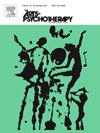Psychosocial benefits of engaging in heritage arts practices in art therapy
IF 1.5
3区 心理学
Q3 PSYCHOLOGY, CLINICAL
引用次数: 0
Abstract
Indigenous and traditional (heritage) arts practices have sustained over time to serve the creative and expressive psychosocial needs of communities. The potential therapeutic aspects of these long-standing practices to promote health and well-being are not well understood. This paper reports preliminary quantitative findings from a global multi-site within-subjects mixed methods research study examining the impact of heritage artforms on affect, anxiety, stress, self-efficacy, and creative agency to understand the physical and psychosocial benefits as applied to art therapy practice. The study participants (n = 54) engaged in two conditions: 1) self-selected preferred heritage art practice and 2) a puzzle task. All participants completed standardized pre and post measures before and after both sessions. Findings indicated that participants reported more positive affect (PA) and less negative affect (NA) after the heritage art task compared to the puzzle task. When interactions between time and task were examined, statistical significance was found for NA as well as anxiety, demonstrating that participants experienced more significant reductions in these areas in the heritage art task compared to the puzzle task. Engaging in heritage artforms may provide multiple psychosocial benefits which may support positive outcomes in art therapy practice.
艺术治疗中参与传统艺术实践的心理社会效益
土著和传统(遗产)艺术实践持续了很长时间,以满足社区创造性和表现力的社会心理需求。这些长期以来促进健康和福祉的做法的潜在治疗方面尚未得到很好的理解。本文报告了一项全球多地点、多学科混合方法研究的初步定量结果,该研究考察了传统艺术形式对情感、焦虑、压力、自我效能和创造性代理的影响,以了解应用于艺术治疗实践的身体和社会心理益处。研究参与者(n = 54)参与了两个条件:1)自我选择的首选遗产艺术实践和2)拼图任务。所有参与者在两次会议之前和之后都完成了标准化的前后测量。研究结果表明,与拼图任务相比,文物艺术任务后的参与者报告了更多的积极影响(PA)和更少的消极影响(NA)。当检查时间和任务之间的相互作用时,发现NA和焦虑的统计显著性,表明与拼图任务相比,参与者在遗产艺术任务中经历了更显著的这些领域的减少。参与传统艺术形式可能提供多种社会心理效益,这可能支持艺术治疗实践的积极结果。
本文章由计算机程序翻译,如有差异,请以英文原文为准。
求助全文
约1分钟内获得全文
求助全文
来源期刊

Arts in Psychotherapy
Multiple-
CiteScore
3.20
自引率
11.10%
发文量
66
期刊介绍:
The Arts in Psychotherapy is a dynamic, contemporary journal publishing evidence-based research, expert opinion, theoretical positions, and case material on a wide range of topics intersecting the fields of mental health and creative arts therapies. It is an international peer-reviewed journal publishing 5 issues annually. Papers are welcomed from researchers and practitioners in the fields of art, dance/movement, drama, music, and poetry psychotherapy, as well as expressive and creative arts therapy, neuroscience, psychiatry, education, allied health, and psychology that aim to engage high level theoretical concepts with the rigor of professional practice. The journal welcomes contributions that present new and emergent knowledge about the role of the arts in healthcare, and engage a critical discourse relevant to an international readership that can inform the development of new services and the refinement of existing policies and practices. There is no restriction on research methods and review papers are welcome. From time to time the journal publishes special issues on topics warranting a distinctive focus relevant to the stated goals and scope of the publication.
 求助内容:
求助内容: 应助结果提醒方式:
应助结果提醒方式:


